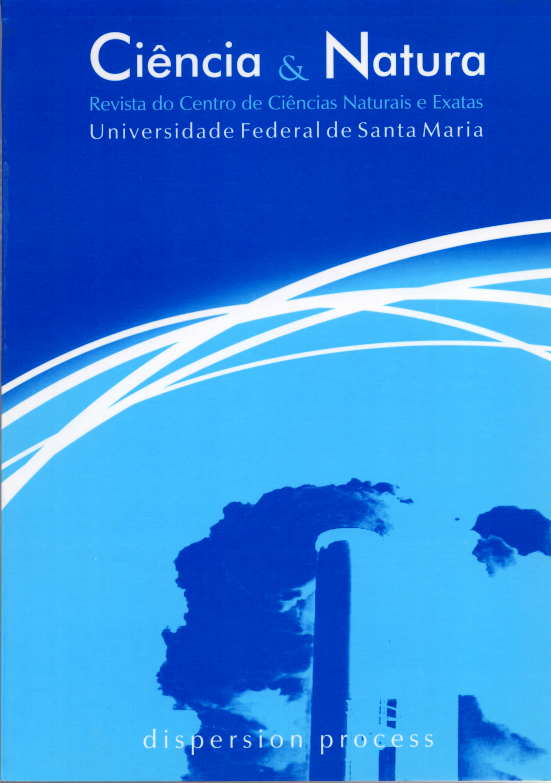Estudo de ocorrência de dutos de evaporação na região oceânica ao largo do Estado do Rio Grande do Sul
DOI:
https://doi.org/10.5902/2179460X63618Resumo
Neste trabalho será estudada a ocorrência de condições de propagação eletromagnética anômalas na camada próxima à superfície do mar, causadas pela formação de dutos de evaporação na costa do estado do Rio Grande do Sul, ao largo do porto de Rio Grande. Serão investigadas as características das feições meteorológicas e oceanográficas, tipicamente associadas às condições da camada superficial, favoráveis à formação dos dutos de evaporação, de forma a serem estabelecidos modelos conceituais aplicáveis para a área de estudo. Para tal, será utilizado um modelo de camada superficial, baseado na teoria de Monin-Obukhov, para a composição de perfis de refratividade atmosférica, a partir de dados de uma bóia meteorológica/oceanográfica fundeada ao largo do porto de Rio Grande. Os resultados do caso estudado mostram que a altura do topo do duto de evaporação foi modulada pela passagem de um sistema frontal naquela região, que alterou os perfis verticais de umidade específica na camada superficial. Houve significativa mudança nas condições de propagação eletromagnética, com a conseqüente possibilidade de variação nos alcances de comunicação/detecção de equipamentos na faixa de VHF, UHF e microondas.Downloads
Referências
Bean, B. R.; E.J. Dutton. Radio Meteorology. [S.I.]: Dover
Publications, 1968. 435 pp.
Space and Naval Warfare Systems Center. Advanced
Refractive Effects Prediction System (AREPS). S.I. : U.S. Navy,
181 pp.
Director of Naval Oceanography and Meteorology. The Effects
of the Environment on Radio and Radar Wave Propagation.
UK:Ministry of Defence, 1984.
Patterson, W. L.. Integrated Reffractive Effects Prediction
System (IREPS). S.I: Naval Ocean Systems Center, 1990. 40 pp.
Arya, S. P. Introduction to Micrometeorology. [S.I.] :
Academic Press, 1988. 303 pp.
BABIN, S.M.; YOUNG, G.S. ; CARTON,J.A.. A New Model of
the Oceanic Evaporation Duct – Journal of Applied
Meteorology, 36, 1990. p.193-204.
Downloads
Publicado
Como Citar
Edição
Seção
Licença
Para acessar a DECLARAÇÃO DE ORIGINALIDADE E EXCLUSIVIDADE E CESSÃO DE DIREITOS AUTORAIS clique aqui.
Diretrizes Éticas para Publicação de Revistas
A revista Ciência e Natura está empenhada em garantir a ética na publicação e na qualidade dos artigos.
A conformidade com padrões de comportamento ético é, portanto, esperada de todas as partes envolvidas: Autores, Editores e Revisores.
Em particular,
Autores: Os Autores devem apresentar uma discussão objetiva sobre a importância do trabalho de pesquisa, bem como detalhes e referências suficientes para permitir que outros reproduzam as experiências. Declarações fraudulentas ou intencionalmente incorretas constituem comportamento antiético e são inaceitáveis. Artigos de Revisão também devem ser objetivos, abrangentes e relatos precisos do estado da arte. Os Autores devem assegurar que seu trabalho é uma obra totalmente original, e se o trabalho e / ou palavras de outros têm sido utilizadas, isso tem sido devidamente reconhecido. O plágio em todas as suas formas constitui um comportamento publicitário não ético e é inaceitável. Submeter o mesmo manuscrito a mais de um jornal simultaneamente constitui um comportamento publicitário não ético e é inaceitável. Os Autores não devem submeter artigos que descrevam essencialmente a mesma pesquisa a mais de uma revista. O Autor correspondente deve garantir que haja um consenso total de todos os Co-autores na aprovação da versão final do artigo e sua submissão para publicação.
Editores: Os Editores devem avaliar manuscritos exclusivamente com base no seu mérito acadêmico. Um Editor não deve usar informações não publicadas na própria pesquisa do Editor sem o consentimento expresso por escrito do Autor. Os Editores devem tomar medidas de resposta razoável quando tiverem sido apresentadas queixas éticas relativas a um manuscrito submetido ou publicado.
Revisores: Todos os manuscritos recebidos para revisão devem ser tratados como documentos confidenciais. As informações ou ideias privilegiadas obtidas através da análise por pares devem ser mantidas confidenciais e não utilizadas para vantagens pessoais. As revisões devem ser conduzidas objetivamente e as observações devem ser formuladas claramente com argumentos de apoio, de modo que os Autores possam usá-los para melhorar o artigo. Qualquer Revisor selecionado que se sinta desqualificado para rever a pesquisa relatada em um manuscrito ou sabe que sua rápida revisão será impossível deve notificar o Editor e desculpar-se do processo de revisão. Os Revisores não devem considerar manuscritos nos quais tenham conflitos de interesse resultantes de relacionamentos ou conexões competitivas, colaborativas ou outras conexões com qualquer dos autores, empresas ou instituições conectadas aos documentos.






